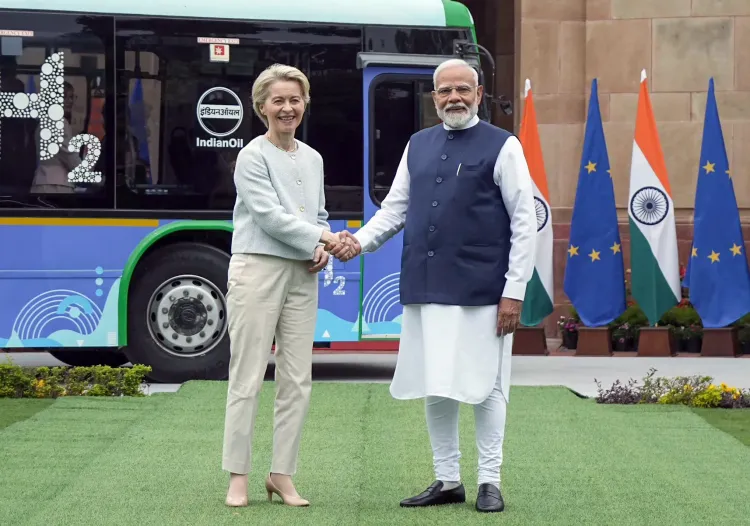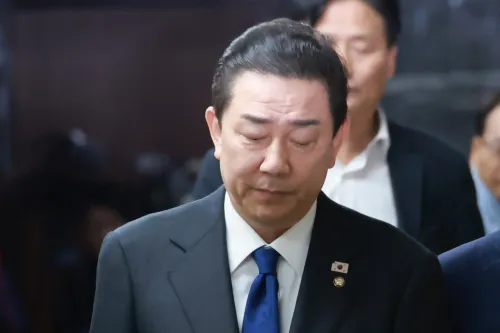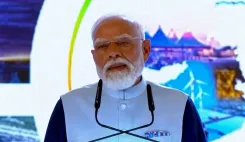Is India Prepared to Elevate Its Relationship with the EU? PM Modi to Ursula von der Leyen

Synopsis
Key Takeaways
- New Strategic EU-India Agenda aims to improve bilateral relations.
- Focus on finalizing the India-EU Free Trade Agreement by year-end.
- Enhanced cooperation in defense and security sectors.
- Potential for significant trade and investment growth.
- Commitment to addressing global challenges together.
New Delhi, Sep 17 (NationPress) During a phone conversation on Wednesday, Ursula von der Leyen, the head of the European Union, conveyed heartfelt birthday greetings to Prime Minister Narendra Modi on his 75th birthday. This call coincided with the European Commission and High Representative's adoption of a Joint Communication that sets forth a ‘New Strategic EU-India Agenda’ designed to enhance and better synchronize bilateral collaboration.
In reply, PM Modi expressed gratitude to Leyen for her kind wishes and confirmed India's eagerness to advance its relations with the European Union.
PM Modi praised the EU's adoption of the new Strategic EU-India Agenda on that day. Both leaders affirmed their dedication to finalizing the India-EU Free Trade Agreement (FTA) negotiations by year-end.
"It’s always a pleasure to connect with President Ursula von der Leyen. I appreciate your warm birthday wishes. I’m thrilled to learn about the 'New Strategic EU-India Agenda' adopted today. India is prepared to elevate our relationship with the EU. This is our shared commitment, mutual goal, and collective responsibility. We are committed to a swift and peaceful resolution of the conflict in Ukraine," PM Modi posted on X.
Throughout their conversation, PM Modi and Ursula von der Leyen discussed regional and global matters of common interest.
"India is committed to a prompt and peaceful resolution of the conflict in Ukraine. PM Modi reiterated his invitation for the next India-EU Summit to take place in India next year," stated a release from the Prime Minister's Office (PMO).
Ursula von der Leyen introduced the initiative within the 2024-2029 Political Guidelines, indicating that the EU's new strategy aims to take its relationship with India to the next level by promoting trade, investment, and talent mobility, while simultaneously enhancing industrial cooperation in the defense sector.
"Now is the moment to concentrate on reliable partners and reinforce alliances founded on shared interests and guided by common values. With our new EU–India strategy, we are elevating our relationship. We are advancing trade, investment, and talent mobility. We are strengthening our joint economic security, advancing the clean transition, and driving innovation together," Leyen remarked.
"We are deepening our industrial cooperation in defense. Europe is already India's largest trading partner, and we are dedicated to completing our Free Trade Agreement by year-end. Europe is open for business, and we are poised to invest in our shared future with India," she continued.
The Joint Communication outlines the EU’s strategic vision for enhancing cooperation with India and pinpoints five areas of mutual interest and complementary strengths, building on existing relationships while addressing areas ripe for increased engagement. Given altering geopolitical realities, closer EU–India relations are essential for bolstering economic growth and security, as well as diversifying supply chains in today’s unpredictable global landscape, as detailed in an EU statement.
"The Joint Communication advances the proposed EU-India Security and Defence Partnership, which will enhance strategic consultations and joint initiatives on crisis management, maritime security, cyber defense, and counterterrorism, while encouraging defense industrial cooperation, boosting production and technological capabilities, securing supply chains, and fostering innovation," it noted.
"Initiating negotiations for a Security of Information Agreement to enable classified information exchanges will bolster closer security and defense collaboration. Other focuses include closer cooperation on the Indo-Pacific, tackling hybrid threats, space security, and intensifying engagement on Russia's war against Ukraine, shadow fleets, and sanctions," the statement added.
The Joint Communication also emphasizes strengthening regional connectivity initiatives, like the India-Middle East-Europe Economic Corridor (IMEC), and promotes the Global Gateway and EU-India trilateral cooperation with third countries. It prioritizes increasing interaction and enhancing coordination between India and the EU at all levels, including skills mobility, with the introduction of the pilot European Legal Gateway Office to facilitate labor mobility. It advocates for the development of a comprehensive mobility cooperation framework encompassing study, work, and research.
"The Joint Communication identifies significant untapped potential in trade and investment, detailing strategies to reinforce commercial ties, particularly focusing on finalizing ongoing negotiations regarding the Free Trade Agreement (FTA). It proposes strengthening supply chains while promoting emerging critical technologies and engagement on digital issues, paying particular attention to enhancing economic security within the Trade and Technology Council (TTC)," stated the EU.
"This new strategy also suggests deepening tech cooperation, which includes a potential EU-India Startup partnership, and invites India to join the Horizon Europe program. It outlines ambitious initiatives for decarbonization and the clean transition, such as enhancing cooperation on renewables, developing green hydrogen capabilities, and expanding green finance. Furthermore, it highlights opportunities to jointly bolster food security, health, climate, and disaster resilience," it concluded.










